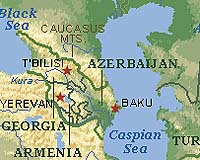 |
Sanaa, Yemen (UPI) Oct 27, 2010 Yemen's government, under intense U.S. pressure to step up its campaign against al-Qaida, is recruiting tribesmen to hunt jihadists the CIA says pose a greater danger to the United States than al-Qaida Central in Pakistan. This plan has many doubters, even in Yemen, where tribes are known to provide sanctuary for the jihadists of al-Qaida in the Arabian Peninsula. For one thing, the largest tribe involved, the Awlaki, is supposed to hunt down one of its own, radical U.S.-born cleric Anwar al-Awlaki, who has been linked to two recent abortive attacks on the United States. Given the power and authority of tribal law, that invariably supersedes state law, it's highly unlikely that hiring tribal mercenaries will produce any results. The tribes are also notorious for shifting loyalties. "The tribe in Yemen has special norms," said Saeed Obeid, an expert on Yemen and author of several books on al-Qaida. "Tribal justice does not permit the surrounding of a fellow tribesman, only an internal trial will suffice." Anwar al-Awlaki is on the Sanaa government's wanted list, as well as being marked for assassination by the Americans because of his alleged involvement in the November 2009 killings at Fort Hood, Texas, and the Christmas Eve attempt to blow up an airliner over Detroit. Several hundred AQAP activists are believed to be hiding in the mountains of southern Yemen, which is also in the grip of an increasingly violent campaign by secessionists seeking separation from Sanaa. One of the main hideout areas is in Shabwa Province, where Gov. Ali Hassan al-Ahmadi said last week the Awlaki tribe, one of the most powerful in the region with many branches, had provided some 2,500 men for the al-Qaida hunt. The fugitive Anwar al-Awlaki is believed to be holed up in Shabwa. The tribal search teams, with each man given 100 rounds of ammunition and a daily stipend of $50, conducted a two-day operation across the province last week and claimed they had swept it clean of al-Qaida. But to no one's surprise, they captured no one, giving weight to the general belief they won't arrest their kinsmen. The decision to recruit tribesmen for the anti-al-Qaida campaign is widely seen as a dangerous ploy, given the tribes' penchant for switching allegiances. One fear is that it could trigger inter-tribal feuds, which would complicate an already complex crisis in which the government is grappling with a simmering Shiite tribal rebellion in the north, the southern secessionist threat, a collapsing economy in which Yemen's oil and water are fast running out, widening unemployment -- and al-Qaida. In this witch's brew of trouble, crushing al-Qaida has low priority for President Ali Abdullah Saleh, who has in the past found the Islamists a useful ally in countering domestic security problems. But the Americans want him to pile on the pressure as Washington sees AQAP becoming increasingly ambitious and innovative in its operations against the United States and Saudi Arabia, Yemen's northern neighbor and a strategic U.S. ally. If, as expected, the new tactic of sending the tribes after the jihadists, which many are suspected to be harboring anyway, fails to nail down AQAP, it's possible the Americans may feel compelled to take direct action of their own. And that would be a risky undertaking. One option is to employ airstrikes using missile-armed drones against jihadist hideouts as the Americans are doing in Pakistan with considerable success in killing key al-Qaida and Taliban leaders. But the downside is the attacks have alienated large numbers of Pakistanis, which makes the military cautious about launching the kind of offensives against the Islamists that Washington is demanding. Limited U.S. airstrikes in southern Yemen starting in December 2009 took out several al-Qaida figures but also killed many civilians and a provincial governor. Resuming such operations would undoubtedly aggravate Saleh and his regime as well as alienate ordinary Yemenis, possibly driving them into aiding al-Qaida, if they're not doing so already. The government's increasingly harsh measures against southern separatists are already paying dividends for al-Qaida. Although there's no evidence of significant collusion between the jihadists and separatists, continued repression by Sanaa could produce an alliance of convenience against Saleh's beleaguered regime.
Share This Article With Planet Earth
Related Links The Long War - Doctrine and Application
 Arab jihadists emerge in Caucasus war
Arab jihadists emerge in Caucasus warAmman, Jordan (UPI) Oct 26, 2010 As Islamic militants escalate their war against the Russians in Dagestan, Ingushetia and other Caucasian republics, there is evidence that Arab jihadists, particularly Jordanians, are playing a leading role, as they did in the Chechen wars. In recent months, Jordanian newspapers and Web sites have reported the death of several Jordanians fighting in Chechnya. But it is the growin ... read more |
|
| The content herein, unless otherwise known to be public domain, are Copyright 1995-2010 - SpaceDaily. AFP and UPI Wire Stories are copyright Agence France-Presse and United Press International. ESA Portal Reports are copyright European Space Agency. All NASA sourced material is public domain. Additional copyrights may apply in whole or part to other bona fide parties. Advertising does not imply endorsement,agreement or approval of any opinions, statements or information provided by SpaceDaily on any Web page published or hosted by SpaceDaily. Privacy Statement |